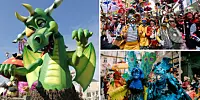-
Costume, music, floats: where to see France’s vibrant carnival parades
Celebrate the end of winter with feasting and fun at a carnival near you
-
Rugby vocabulary to know if watching the Six Nations in France
From un tampon to une cathédrale, understand the meaning of key French rugby terms
-
February events in France: Art, agriculture, and festivals
Discover the reopening of Bonnat-Helleu Museum, Paris International Agricultural Show, Menton's Citrus Festival, and Matisse exhibition in Bordeaux
Freemasonry in France marks 300th year
Lodges opened their doors to the public to mark special anniversary

Freemasonry celebrated its 300th anniversary this summer, with lodges throughout France opening their doors to the public.
The special open days in June, aimed at removing the mystery and suspicion often associated with freemasonry, included talks, visits of masonic premises, lodge rooms and museums, and ‘open meetings’ for family and close friends of members, in many cases followed by a meal.
There are over twenty masonic bodies in France. The usual term known to English-speakers is “Grand Lodges”, but on the continent of Europe other appellations are used, the best known of which is “Orients”. In Cognac, there was a public conference in the town centre, given by two Grand Masters from one of the several Grand Lodges in France. A good sprinkling of British were said to have been present among the 200 visitors.
“The anniversary has resulted in a large influx of requests to join the Cognac English-speaking lodge,” a spokesman told Connexion. Feedback suggests that Brexit is a factor in people wishing to take the plunge and join the French Lodges, who welcome the prospect of receiving them and point out the possibility of enabling English-speakers to set up English-speaking lodges.”
France is very active in masonic terms and numbers are growing, with both sexes free to join, but while there are some mixed lodges, on the whole they tend to be men-only or women-only. Recent membership figures show an approximate total of 175,000.
Meetings usually take place once or twice a month with conviviality a key aspect, and friendships develop involving whole families. “Other benefits for new members in France include improving your language skills – freemasons do tend to talk a lot, so if your French is shaky, it will soon improve!” said the spokesman.
Joining a lodge is no more difficult than joining any other well-known club, as long as a candidate can prove himself or herself to be an honest person.
“There are a few English-speaking lodges in various parts of France and others can always be formed to meet the needs in any given town or region. A non-mason can apply to join, as well, of course, as masons from other countries.”
The June open days took place to mark 300 years since the founding of the first “Grand Lodge” of freemasons on June 24, 1717.
Known as the “Grand Lodge of London and Westminster,” or the “Premier Grand Lodge”, it was first mentioned in writing by a Scottish Presbyterian, Dr James Anderson, when he wrote the second edition of his Book of Constitutions in 1738.
Lodges existed before 1717, but no such thing as a Grand Lodge, or central authority, existed. The lodges and many other “clubs” met in taverns – there was nowhere else to go except coffee-houses and chocolate-houses.
The ethos of masonry dictates that distinction of any kind based on religion or politics is banned, all religious beliefs and democratic political ideas are tolerated, and all professions and hierarchies are represented, without distinction or prejudice.
Subscription costs are kept as low as possible, the largest expense for most lodges being the rent of premises, and most lodges make discrete (non-ostentation is seen as part of the ethos) donations to charity.
Readers seeking information about freemasonry in France and how to join a lodge can contact: etienne.casadalt@gmail.com
























